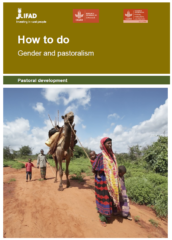
IFAD plays a leading role in supporting rural women engaged in crop, livestock and fisheries production. Gender issues have been integrated within IFAD projects and programmes since 1992 and mainstreamed across IFAD as an organization since 2003. There is now an increased focus on methodologies that can lead to gender transformative change in order to empower women and promote equitable development for men and women.
IFAD’s global pastoral development programme recognizes that pastoralists live in often remote and challenging environments and require a specialized approach to livestock development in accordance with their unique cultural and livelihood production systems. IFAD has undertaken a wide range of initiatives to support poor livestock producers, and specifically focused on the needs of pastoralist women who face particular obstacles to access the resources that they need for their livelihoods.
This HTDN complements the IFAD Toolkit and HTDN on Pastoralism produced in 2018, which highlights the importance of gender in pastoral production systems. This How To Do Note on Gender and Pastoralism builds on this introduction highlighting important issues and tools to use to address them. This HTDN is designed for country programme teams, consultants and technical advisors, with the objective of providing guidance on the designing of projects with gender-sensitive interventions targeted at empowering pastoralist women so as to achieve more equitable development.
The HTDN is divided into two main sections. Section One identifies the issues that particularly impact pastoralist women and gender dynamics and highlights the need for greater women’s empowerment. It introduces the relevant IFAD policies and publications that have helped broaden understanding of gender issues within pastoralism and brings in lessons learned from other agencies. Section Two provides practical guidance that project developers and others can use for more gender-sensitive interventions with pastoralists. Reference materials, as well as gender-focused tools and checklists that can help in project development, are also provided.
Download the report on the link below.
